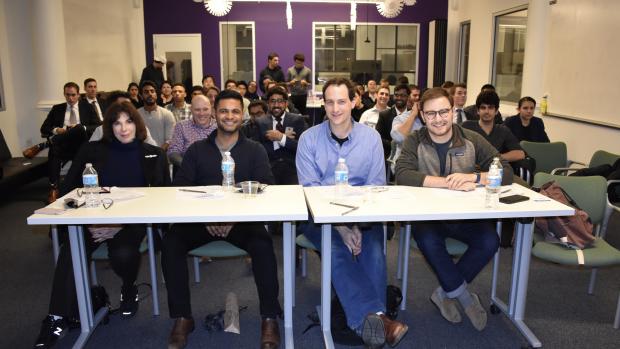It Takes a Top Team to Be InnoVentive

It had been a whirlwind few weeks. After finding like-minded colleagues with complementary skills at “Team Hunts” in December and January, getting advice from seasoned business founders in early February, and submitting their proposals on February 12, the aspiring entrepreneurs taking part in this year’s InnoVention Competition were given guidance on business models and customer development, coached on how to pitch, and readied themselves to stand in front of a group of judges on February 28 to present their ideas and find out whether they would be advancing to the next round of competition.
InnoVention is a prototyping competition hosted by the NYU Entrepreneurship & Innovation Association and supported by the Future Labs and Tandon School of Engineering, and the excitement was palpable at that evening’s event, held at the Data Future Lab. Teams, many of them dressed in their sharpest business wear, were given two minutes to pitch their ideas and three minutes to answer question from a group of judges that included Carol Siegel, a founder of the Ruth & Jerome Siegel Charitable Foundation; Zak Kukoff, Managing Partner at Dorm Room Fund NYC; Kunal Mehta of the NYU Innovation Fund; and NYU Professor David G. Lefer, who directs the Innovation and Technology Forum.
Proposed products and services ran the gamut from healthcare solutions to infrastructure innovations to security-related apps, and while each was impressive, only the top ideas were chosen to progress to the next round of competition. These include:
- Aduri, a multisensory meditation micro-environment that immerses users into a deep meditative state quickly and easily
- LIADS, a lightweight, intelligent anti-drone system that can detect, identify, track, and neutralize malicious drones in war zones or anywhere else they may be deployed
- Accumulab, a software solution that allows researchers to share and replicate results
- NVIP, a mobile tool that allows visually impaired people to interpret and explore the visual world and safely move around the city by understanding their immediate surroundings
- Levitas, a wearable activity monitor that detects a patient’s intent to stand, and alerts nurses reliably while deterring patient movement, thus lessening the chance of a costly and painful fall
- Medadermal Patch, a bandage-like system for delivering pain medication quickly and efficiently into the bloodstream
- The Multicorder, an affordable educational tool that aims to bring hands-on science labs to students who might not otherwise have access to them
- State Space Labs, a platform that brings cutting-edge neuroscience to bear on the field of e-sports.
- Trade Roads, a system of placing hardware monitors on vehicles or software onto the smartphones of drivers who make frequent trips to detect road quality and route frequency, thereby improving infrastructure in the developing world
- Vigilant, a wearable monitor that can be used by military personnel to ensure that no service person gets left behind, even in the most dangerous situations
- Vizit, a location-based virtual reality guide that offers people an interactive and immersive tourist experience and transforms their interactions with historic sites and locations
- Wave, a system for gamers, coders, and others that uses real-time neural commands to avoid conditions caused by repetitive stress, such as carpal tunnel and tendinitis
Companies will next attend workshops on prototyping and product development, meet with mentors, and refine their ideas before pitching again, at the semifinal qualifiers in April.
Entrepreneurship & Innovation Association calendar.




